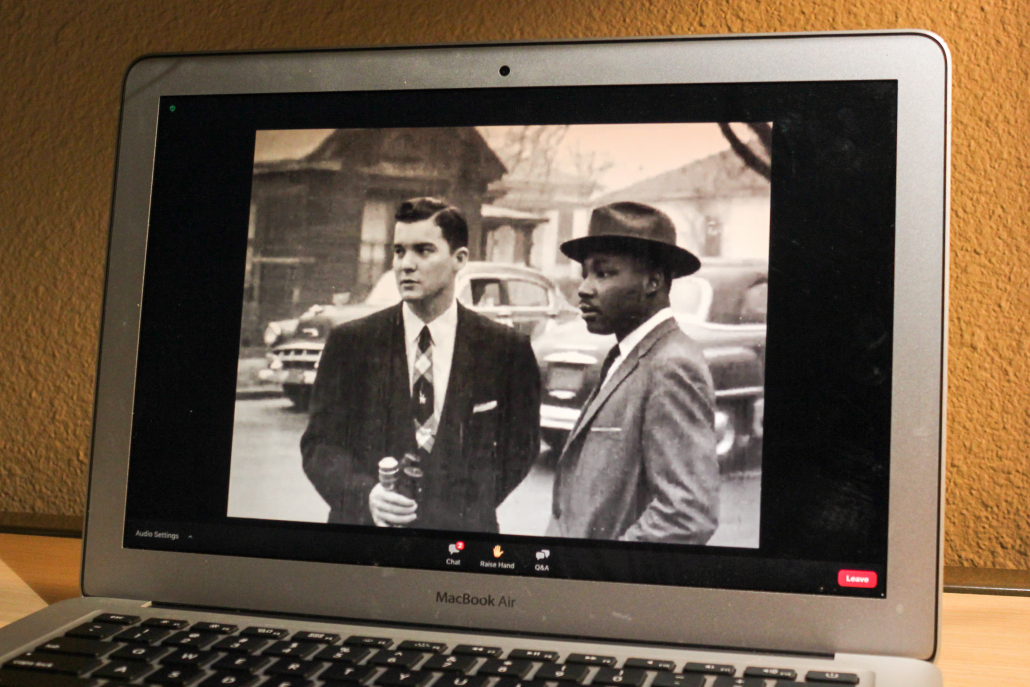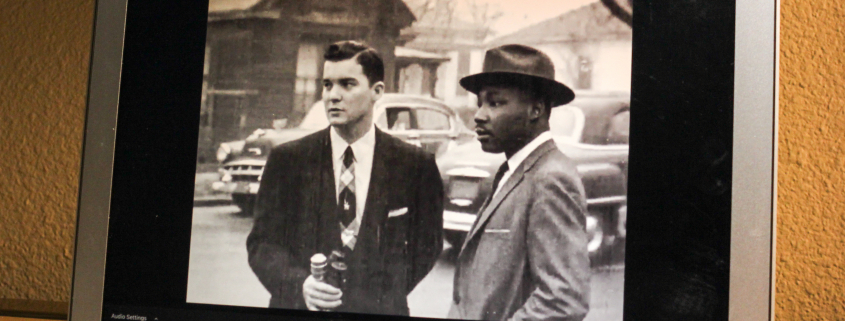‘MLK/FBI’ offers a glimpse at the FBI’s surveillance of Martin Luther King, Jr.

The School of Cinematic Arts held a live Zoom screening of “MLK/FBI” Wednesday, the first film to uncover the extent of the FBI’s surveillance and harassment of Dr. Martin Luther King, Jr. The recipient of rave reviews and praised for its timeliness and cultural relevance, “MLK/FBI” dissects the escalating tensions between the two titular parties throughout King’s career.
The evening started with an announcement by Victoria Renee, co-president of USC’s African American Cinema Society (AACS) about an upcoming event, and then moved into the live screening. The screening was followed by a Q&A with “MLK/FBI” director Sam Pollard and moderated by Nana Adwoa Frimpong, a graduate student studying film and television production.
The film’s trailer opens on a shot of the unmistakable 27-year-old Baptist minister from Alabama saying, “He who lives by the sword shall perish by the sword.”
Using newly discovered and declassified files, the documentary explores King was at the time considered by the FBI to be the greatest threat to the internal security of the United States.
The documentary features interviews with two of King’s confidants, Andrew Young and Clarence Jones, as well as former FBI Director James Comey and former FBI investigator Charles Knox. It also interviews three historians who wrote about King’s relationship to the FBI and other figures in the counterintelligence community such as David Garrow, Beverly Gage and Donna Murch.
“MLK/FBI” takes a nuanced look at the iconic figure of King throughout his career as a pastor to his time as a renowned public figure up until his assassination in 1968. The film looks at King’s life through the lens of the largest law enforcement agency in the nation and provides an analysis of the FBI’s relationship with King, namely with then-FBI Director J. Edgar Hoover.
“It’s really a parallel story,” Pollard said. “It’s a story about the ascendency of King and all he had to confront. At the same time, the FBI saw him as this Black messiah who was going to undermine American society, and [the film looks at] the methods they were going to go through to try to destroy his reputation.”
Initially, Hoover’s logic was that King had connections to the Communist Party, which held ties to the Soviet Union, which the FBI used as a basis to launch covert operations against King for espionage reasons. The suspicions of King’s association with communism quickly evolved when FBI wiretaps suggested evidence of King’s non-monogamous sexual relations. Through wiretapping and bugging, the FBI built a case for King’s immorality without the approval or authority of anyone outside the FBI.
As Pollard reveals in the Q&A, the documentary idea came to producer Ben Hedin from historian David Garrow’s book, “The FBI and Martin Luther King, Jr.: From ‘Solo’ to Memphis.” Pollard said he saw the film as an opportunity to “dig into the complexities of King’s life but also [to] demythologize the FBI.”
Making use of the Freedom of Information Act and the National Archives, as well as revelatory restored footage, the film “explores the government’s history of targeting Black activists and the contested meaning behind some of our most cherished ideals.”
From one of King’s first live broadcasts in 1956 to his great “I Have A Dream” speech in 1963, “MLK/FBI” shows the behind-the-scenes turmoil the FBI created through the gradual, constant surveillance of King. On the other hand, the film also unpacks the FBI’s clandestine agenda against King during a time when the public opinion of King was still divided.
In the Q&A, Pollard said that it surprised him to see a 1964 poll with approval ratings that were higher for Hoover than for King.
“Hoover wasn’t an outlier, he was [speaking] to what the mainstream media thought about King,” Pollard said, regarding public perceptions of King as overly radical.
Stylistically, Pollard chose to record all of the interviews on tape and off camera, purposely excluding the talking heads of interview subjects. This was inspired by the stylings of the film “The Black Power Mixtape 1967-1975” (Göran Olsson), allowing the audience to zone in on what the subjects are saying as they narrate the film.
These interviews develop the notion of King as a man rather than an icon and examine the character of King through his highs and his lows, Pollard said.
“In the last five to six years, I’m looking at people who I have a tremendous amount of respect for, but I’m looking for the chinks in the armor. You can’t tell stories like this without doing that,” he said.
By exposing details of his private life, the FBI hoped to undermine MLK and weaken his image as a leader.
“He was looked at as somebody who was undermining the notion of American democracy,” Murch says in the film.
Pollard advises young filmmakers to challenge their own perspectives.
“Don’t make films [where] you’re going to say ‘I’m talking to the left or I’m talking to the right.,’” he said. “Make films that challenge people’s perceptions of everything that we’ve gone through in the last months. Make films that lead to discussion and debate.”
When asked if there are any changes he would make to the film given the new momentum of the Black Lives Matter movement in the media, Pollard responded, “No. Because when you watch this film, it’s like looking in a two-way mirror. It’s America today. It’s amazing. Sad and amazing.”

